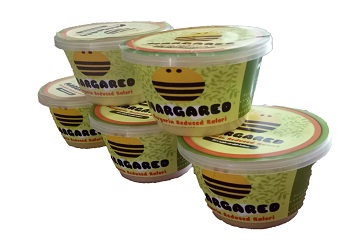IPB Researchers Develop Low-Calorie Margarine Product

Nutritional recommendations related to fat consumption have been widely practiced, one of which is the need to reduce the consumption of trans and saturated fat. The negative effects of trans and saturated fat on cardiovascular health are related to its role in increasing bad cholesterol. Therefore, one of the efforts made is to replace trans and saturated fat with unsaturated one.
Margarine is one of the fatty foods that is often consumed by the community. Margarine can be consumed directly as a spread, or as a mixture in the cooking process. Margarine serves as a heat conductor medium. Fat addition aims to improve the texture and taste of food.
Consumption of margarine as a source of fat cannot be avoided because fat is beneficial to improve the aroma and delicacy of food. People's awareness of choosing foods with added nutritional value is increasing now, so it becomes an opportunity to develop margarine product, especially in terms of decreasing the calorie value of the margarine.
This motivates researchers of Bogor Agricultural University (IPB), Prof. Dr. Ahmad Sulaeman and Reisi Nurdiani, SP. M.Si, with a student from the Department of Community Nutrition, Faculty of Human Ecology (FEMA IPB), Theresia Dwi Wahyuni, to conduct a study on making low-calorie margarine with palm oil, coconut oil and soybean oil as base materials and the addition of beeswax.
Beeswax is a natural animal fat that cannot be digested by human digestive system, so it does not contribute to the number of calories absorbed in the body's metabolic system. When beeswax is used as a base material of margarine, it will produce a high melting point affecting the margarine texture. Therefore, it must be mixed with other components in order to lower the melting point.
The study was divided into several stages, namely beeswax preparation, margarine modification formulation from three types of vegetable oil, organoleptic test, physical and chemical characteristics analysis and nutritional value information analysis for selected margarine product. There were two tested formulas made of three types of vegetable base oil. Each vegetable oil was added by 25 percent and 35 percent beeswax.
The test results showed that the selected formula is margarine with soybean oil and 25 percent beeswax. The selected formula has a melting point of 54.1 Celsius degrees and an emulsion stability of one hundred percent. Selected margarine contains 35 percent energy content, 33 percent total fat, 73 percent unsaturated fat and 24 percent sodium which are lower than commercial margarine. The margarine also qualifies the claim for reduced calories and fewer fat. (TK)


